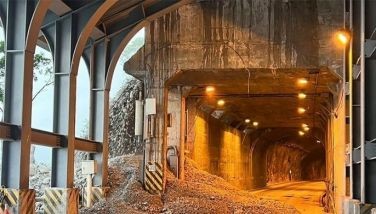Problems pile up in Asia for US policymakers
WASHINGTON — The Obama administration is making diplomatic progress on some of Mideast's most thorny security issues but problems are piling up in a region that Barack Obama had wanted to play a bigger part in American foreign policy: Asia.
Despite efforts to forge deeper ties with China to make East Asia more stable, Beijing's declaration of a maritime air defense zone has escalated its territorial dispute with U.S. ally Japan. The U.S. responded by flying B-52 bombers through it on a training mission Tuesday without informing Beijing.
Analysts say the risk of a military clash between the Asian powers has gone up a notch — a serious concern for the U.S. because its treaty obligations mean it could be drawn in to help Japan.
Meantime, relations between America's core allies in the region, Japan and South Korea, always uneasy, have deteriorated. South Korea is bitter at Japan's attitude toward its colonial past and wants more contrition from Tokyo over Japan's use of Korean sex slaves in World War II.
That complicates the strategic picture for the Obama administration as it looks to advance its so-called "pivot" to Asia and strengthen not just its own alliances, but get its partners in the region to collaborate more.
"The region is moving in a very problematic direction," said Evans Revere, a former senior U.S. diplomat and East Asia specialist. "That's the result of territorial disputes, historical issues, long-standing rivalries and the inability of countries to put history behind them and move forward in improving relations."
Adding to this witches' brew of bickering in the region, Washington is grappling with the threat posed by an unpredictable North Korea. The deal the U.S. orchestrated with Iran to temporarily freeze its nuclear program, despite three decades of animosity, is a stark reminder of the impasse in negotiations with Pyongyang.
Unlike Iran, North Korea already has a nuclear bomb, and there's worrying evidence it is pressing ahead with weapons development.
Analysts expect Vice President Joe Biden to broach these issues when he travels to Japan, China and South Korea next week — a trip to demonstrate the top level of the administration remains focused on Asia.
Top U.S. diplomat John Kerry hasn't neglected the region, but his primary focus is on the Mideast and is likely to remain that way as he strives for the distant goal of an end to Syria's civil war, peace between Israel and Palestine, and a comprehensive nuclear agreement with Iran after the current pact expires in six months.
U.S. domestic woes have contributed to a narrative that Asia is a secondary concern to the administration.
Obama was forced to cancel a four-nation trip to the region in October because of a partial U.S. government shutdown and threat of a debt default. He'll travel to Asia in April instead.
Obama made Asia a foreign policy priority when he took power in 2009, and been particularly active in engaging China. Not known for the personal touch with foreign leaders, Obama sought to cultivate a relationship with new Chinese leader Xi Jinping when he met him in June at a California resort. That's part of strategy to promote cooperation between the world's two largest economies and prevent their strategic rivalry in the Asia-Pacific spawning conflict.
But China's declaration at the weekend of its East China Sea air defense zone will be viewed as unhelpful. It was rejected by Japan, South Korea and Taiwan, and prompted quick expressions of deep U.S. concern that it could escalate tensions in the region.
"This really casts bit of a pall over efforts to improve (U.S.-China) relations," Revere said.
The U.S. said it would not change how it conducts military operations in the region, and flew a pair of B-52 bombers through the zone Tuesday on what officials said was a long-planned training mission.
Bonnie Glaser, a China specialist at the Center for Strategic and International Studies, expected Biden to raise it with both civilian and military leaders in China. She said while countries have a right to declare such a zone — the U.S., South Korea and Japan all have them — there will be concern about how China would enforce it.
"The question is how many times China will scramble their jets and against whom," she said.
Analysts don't expect immediate confrontations with foreign aircraft, but say the move fits a pattern of putting teeth behind China's territorial claims and could potentially lead to dangerous encounters. While enforcement is expected to start slowly, Beijing has a record of playing the long game, and could gradually scale-up activity.
The zone encompasses unoccupied but Japanese-administered islands that Japan calls Senkaku and China calls Diaoyu. Since Japan nationalized some of the islands a year ago, there's been a constant cat-and-mouse between the two nations' sea vessels and aircraft.
There's been no skirmish, although Japan accused China in January of locking targeting radar on a Japanese helicopter and frigate, which underscored the risks of a clash.
Proponents of the U.S. pivot view a strong American military presence and diplomatic engagement as essential to maintaining the decades of relative stability and economic prosperity the region has enjoyed.
But the rift between South Korea and Japan, which host some 80,000 U.S. forces between them, complicates that task. As well historical issues that dog relations between the U.S. allies, the nationalist Japanese leader's intent to allow a more active role for its military, which is constrained by a pacifist constitution, has further alienated South Korea.
Victor Cha, White House director for Asia affairs under George W. Bush, said that has raised concerns that Seoul is siding with Beijing on the issue. Although Seoul has voiced concern over the new Chinese air defense zone, he said the Obama administration faces a major strategic problem: "How do you pivot to Asia when your two main allies are deeply in conflict with each other?"
- Latest
- Trending
































